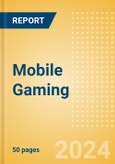Key Highlights
The growing maturity of streaming (supported by 5G), cloud gaming, and mobile esports, combined with the fact that mobile platforms are close to technological parity with PCs and consoles, means most gamers will embrace mobile gaming in the next few years. The ability to run high-quality, big-budget games (e.g., Resident Evil 4 and Assassin’s Creed Mirage) on mobile platforms will attract more publishers and gamers.Due to its lucrative revenue prospects, console and PC game publishers such as Activision Blizzard (owned by Microsoft) and Take-Two Interactive are heavily focused on mobile gaming. In addition, video streaming services (e.g., Netflix) and online advertisers (e.g., AppLovin) are also in the race.
Regulation will continue to be a disruptive threat for the foreseeable future. In 2023, China’s draft regulation to curb in-game spending wiped $80 billion in market value from Tencent and NetEase. Regulations around in-app purchases, data privacy, child safety, antitrust, artificial intelligence (AI), and app store commissions will continue to impact all mobile gaming companies.
Scope
This report provides an overview of the mobile gaming theme.It identifies the key trends impacting growth of the theme over the next 12 to 24 months, split into three categories: technology trends, macroeconomic trends, and regulatory trends.
It contains a comprehensive industry analysis, including global market size and growth forecasts for mobile gaming, details of M&A deals driven by the mobile gaming theme, and a timeline highlighting milestones in the development of mobile gaming.
The detailed value chain comprises four layers: creation, monetization, distribution, and device. Leading and challenging vendors are identified across three of the four layers.
Reasons to Buy
The growing maturity of streaming (supported by 5G), cloud gaming services, and mobile esports, combined with the fact that mobile platforms are close to technical parity with PCs and consoles, means most gamers will embrace mobile gaming in the next few years. This report will tell readers everything they need to know about this significant and dynamic theme.Table of Contents
- Executive Summary
- Players
- Technology Briefing
- Trends
- Industry Analysis
- Signals
- Value Chain
- Companies
- Sector Scorecard
- Glossary
- Further Reading
- Thematic Research Methodology
Companies Mentioned (Partial List)
A selection of companies mentioned in this report includes, but is not limited to:
- 37Games
- A1 Telekom
- Acer
- Ad Formats
- AdColony
- AdMob
- AfreecaTV
- Akamai
- Alibaba
- Alphabet (Google)
- Amazon
- American Express
- Ant Group
- AppBrain
- Apple
- AppLovin
- Appnext
- AppOnboard
- Asus
- AT&T
- Baidu
- Baishan
- Bharti Airtel
- Bilibili
- Black Shark
- BT Group (EE)
- ByteDance
- Chatboost
- China Mobile
- China Telecom
- Chukong Technologies
- Cloudflare
- Coinbase
- Colopl
- CyberAgent
- DeNA
- Deutsche Telekom
- DHL
- Digital River
- Digital Turbine
- DouYu
- Electronic Arts
- Endeavor Group
- Enjin
- Epic Games
- F5
- Fastly
- Game Creators
- Gamevil
- Gamua
- Godot Engine
- Huawei
- Hutchison (Three UK)
- Huya
- IBM
- IGG
- Ingenico
- InMobi
- Innersloth
- Jampp
- JetSynthesys
- JP Morgan (WePay)
- Kakao
- KFC
- Kingsoft
- Krafton
- Lenovo
- LG Uplus
- Liftoff
- Limelight
- Line
- Loco TV
- Mastercard
- McDonald’s
- MediaLab AI (Kik)
- Mercedes-Benz
- Meta
- MetaMask
- Microsoft
- MiHoYo
- Mintegral
- Mistplay
- MonoGame
- Monster Energy
- Nazara
- NCSoft
- NetEase
- Neteller
- Netmarble
- Nexon
- Nike
- Nintendo
- Nubia
- One Esports
- One97 (Paytm)
- Ooredoo
- Opera
- Oppo
- Oracle
- OSIM International
- P&G
- PayPal
- Paysafe
- Perfect World
- Phantom
- Puma
- Qihoo 360
- Qualcomm
- Rackspace
- Rakuten (Viber)
- Razorpay
- RedBull
- Reliance Jio
- RFRSH Entertainment
- Roblox
- Ronin
- Rooter
- Samsung Electronics
- Savvy Group (ESL)
- Scatter
- Sea (Garena)
- Sega Sammy (Rovio)
- Simutronics
- Sina
- Singtel
- SK Telecom
- Skrill
- Sky
- Snap
- Sony
- Square Enix
- StackPath
- StartApp
- Stripe
- Supersonic Studios
- Swisscom
- Take-Two Interactive
- Tapjoy
- Tecno
- Telecom Italia
- Telefónica
- Telegram
- Telstra
- Tencent
- T-Mobile
- Ubisoft
- UnionPay
- Unity Technologies
- Verizon
- Viaplay
- Visa
- Vivendi (Gameloft)
- Vivo
- Vodafone
- Vungle
- Walt Disney
- Wax Cloud
- Wombat
- XD
- Xiaomi
- Xsolla








